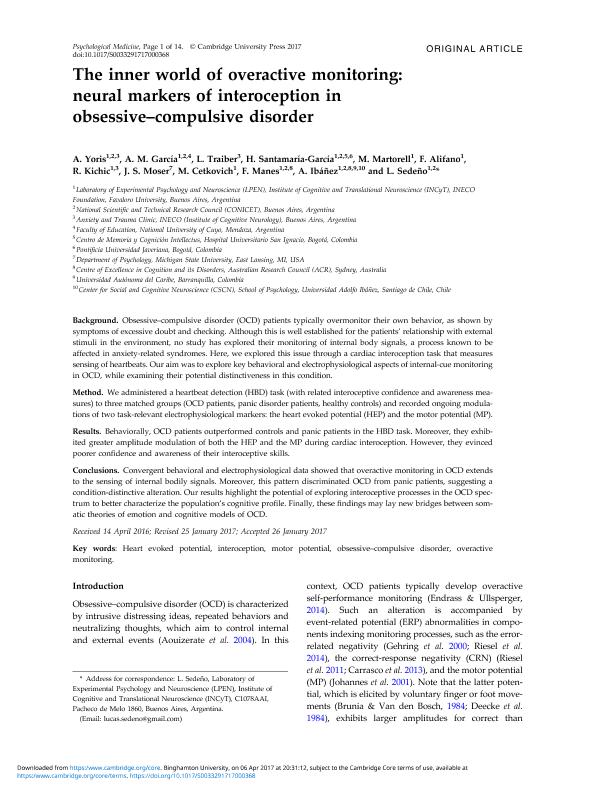Artículo
The inner world of overactive monitoring: Neural markers of interoception in obsessive-compulsive disorder
Yoris Magnago, Adrián Ezequiel ; García, Adolfo Martín
; García, Adolfo Martín ; Traiber, Liliana; Santamaria Garcia, Hernando
; Traiber, Liliana; Santamaria Garcia, Hernando ; Martorell Caro, Miguel Angel
; Martorell Caro, Miguel Angel ; Alifano, F.; Kichic, R.; Moser, J. S.; Cetkovich, M.; Manes, Facundo Francisco
; Alifano, F.; Kichic, R.; Moser, J. S.; Cetkovich, M.; Manes, Facundo Francisco ; Ibañez, Agustin Mariano
; Ibañez, Agustin Mariano ; Sedeño, Lucas
; Sedeño, Lucas
 ; García, Adolfo Martín
; García, Adolfo Martín ; Traiber, Liliana; Santamaria Garcia, Hernando
; Traiber, Liliana; Santamaria Garcia, Hernando ; Martorell Caro, Miguel Angel
; Martorell Caro, Miguel Angel ; Alifano, F.; Kichic, R.; Moser, J. S.; Cetkovich, M.; Manes, Facundo Francisco
; Alifano, F.; Kichic, R.; Moser, J. S.; Cetkovich, M.; Manes, Facundo Francisco ; Ibañez, Agustin Mariano
; Ibañez, Agustin Mariano ; Sedeño, Lucas
; Sedeño, Lucas
Fecha de publicación:
08/2017
Editorial:
Cambridge University Press
Revista:
Psychological Medicine
ISSN:
0033-2917
Idioma:
Inglés
Tipo de recurso:
Artículo publicado
Clasificación temática:
Resumen
Background. Obsessive-compulsive disorder (OCD) patients typically overmonitor their own behavior, as shown by symptoms of excessive doubt and checking. Although this is well established for the patients' relationship with external stimuli in the environment, no study has explored their monitoring of internal body signals, a process known to be affected in anxiety-related syndromes. Here, we explored this issue through a cardiac interoception task that measures sensing of heartbeats. Our aim was to explore key behavioral and electrophysiological aspects of internal-cue monitoring in OCD, while examining their potential distinctiveness in this condition. Method. We administered a heartbeat detection (HBD) task (with related interoceptive confidence and awareness measures) to three matched groups (OCD patients, panic disorder patients, healthy controls) and recorded ongoing modulations of two task-relevant electrophysiological markers: the heart evoked potential (HEP) and the motor potential (MP). Results. Behaviorally, OCD patients outperformed controls and panic patients in the HBD task. Moreover, they exhibited greater amplitude modulation of both the HEP and the MP during cardiac interoception. However, they evinced poorer confidence and awareness of their interoceptive skills. Conclusions. Convergent behavioral and electrophysiological data showed that overactive monitoring in OCD extends to the sensing of internal bodily signals. Moreover, this pattern discriminated OCD from panic patients, suggesting a condition-distinctive alteration. Our results highlight the potential of exploring interoceptive processes in the OCD spectrum to better characterize the population's cognitive profile. Finally, these findings may lay new bridges between somatic theories of emotion and cognitive models of OCD.
Archivos asociados
Licencia
Identificadores
Colecciones
Articulos(OCA HOUSSAY)
Articulos de OFICINA DE COORDINACION ADMINISTRATIVA HOUSSAY
Articulos de OFICINA DE COORDINACION ADMINISTRATIVA HOUSSAY
Citación
Yoris Magnago, Adrián Ezequiel; García, Adolfo Martín; Traiber, Liliana; Santamaria Garcia, Hernando; Martorell Caro, Miguel Angel; et al.; The inner world of overactive monitoring: Neural markers of interoception in obsessive-compulsive disorder; Cambridge University Press; Psychological Medicine; 47; 11; 8-2017; 1957-1970
Compartir
Altmétricas



